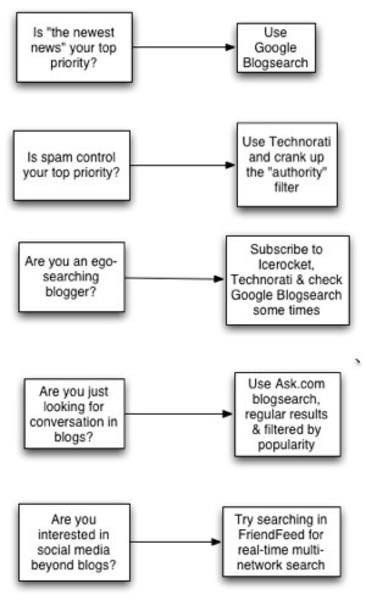Some of you busy Facebooking, Tweeting and Plussing may not remember the time when blogging rocked the world. Not so many years ago, blogging software caused a revolution in media lead by people like Evan Williams, Dave Winer, Meg Hourihan and the Trott family.

When the number of publishers and media outlets, from the casual to the professional, exploded in the mid 2000’s, many people were sure that this body of content needed to be searched differently than Google searched old fashioned web pages. Scores of blogsearch startups emerged and now almost all of them have faded away into obscurity or advertising. One stayed vibrant and innovating, though, after all these years:IceRocket. This week IceRocket found a new home at a larger company, social media monitoring firm Meltwater. Icerocket meets Meltwater seems like a story of liquefaction, but time will tell how the technology transitions into a new post-search era.
Back in the blog search heyday, companies like Technorati, BlogDigger, IceRocket and others thought that millions of people would want to seek out topic-focused, long-form, self-publishers, many of whom were using a hosted Content Management System to publish on a website they owned themselves. Oh for those heady days!
Right: A survey of the fast-collapsing blog search market, circa January 2009.

There were no News Feeds or Walls, only what was called Really Simply Syndication readers (like Google Reader). We’re talking ancient history here, people, more than five, maybe six years ago. (Decades at least in the dog years of fast-evolving social web technology.)
User experience and interface design were big challenges for all those companies that knew they had tapped into something incredible, but couldn’t yet convince most of the world to get onboard. It was, and is still, a life changing experience to open up an RSS reader and consume a roaring river of news and opinion from the publishers you’ve hand selected to check for new content from automatically, all in one centralized place.
But for reasons that nerd historians will perhaps only someday understand, that stuff never caught on at scale.
Since then, IceRocket continued innovating. It learned to ingest granular fields of data in the blog posts it found, it expanded to include the faster-growing worlds of Facebook and Twitter, it looked the Social Media Spam Monster right in the eye and it started throwing punches. (Or at least, it did a pretty good job of spam control in a very spammy space.)
Where does a last-decade blog search engine go now? Into social media monitoring, that’s where.
Even back in the blog search days, people knew that real power lay in subscribing to persistent searches. The tools to do that were, apparently, too bare metal for marketers, though.
I once did a project for Sun Microsystems where I put together 10 search queries each with at least 5 Boolean operators for Google Blogsearch, then scraped the results pages to remove HTML cruft and pushed the results into one feed delivered straight and another feed run through a buzz filter, then sent both of those into a Planet aggregator and put them up on the Sun site for the company’s annual developer conference. It was awesome and in addition to paying me nicely for it, the company flew me to the event to interview singer Neil Young. It was RSS rock and roll.
These days that kind of stuff just isn’t going to fly, though. The social web has exploded beyond cat gifs and jokes about how is babby formed and is now full of everyday people posting little updates about sex and TV and corporate brands.
Those brands want tools that are half magnets and half divining rods; technology that will find any badmouthing about their crappy products, decide whose opinions really matter and then place a button that can be pushed to neutralize the negativity in the laps of PR agents, with a pretty red ribbon tied around it. They are willing to pay a lot of money for that, too. (Other use cases include facilitated, real-time, authentic community engagement at scale.)
One of the firms selling social media monitoring quite successfully is the now ten year old Norwegian firm Meltwater. Meltwater was one of the first firms in Europe, if not the world, to bring press clippings services into the web world.
Meltwater booked $100 million in business last year and is now scooping up tech startups. In February the company acquired social media monitoring startup BuzzGain and in March it acquired social CRM startup JitterJam. Now it’s swallowed up IceRocket and will integrate its technology, mathematicians and other staff into the Meltwater suite of products.
What will that look like? It’s hard to say, but it’s clear that the big dreams of blog and social media search haven’t panned out as stand-alone businesses. Meltwater is an example of the red hot world of automated, algorithm driven pull-based media monitoring and display. The company has several different products and the one I saw demonstrating did not impress me very much at all. The others are said to be more powerful but the demand is clear for anything that will help the rest of the world manage the torrent of Tweets and Facebookings and Plusses.
And so what was once a promising startup in the past gets subsumed by a future that outdid what seemed like a deafening storm of new publishing, not so long ago. If you’d told the blog lovers of the last decade that the medium would be dwarfed by a much, much larger and arguably more disruptive movement of self publishing in the form of social networking, I don’t know what people would have said. That seems to be what happened though.

















